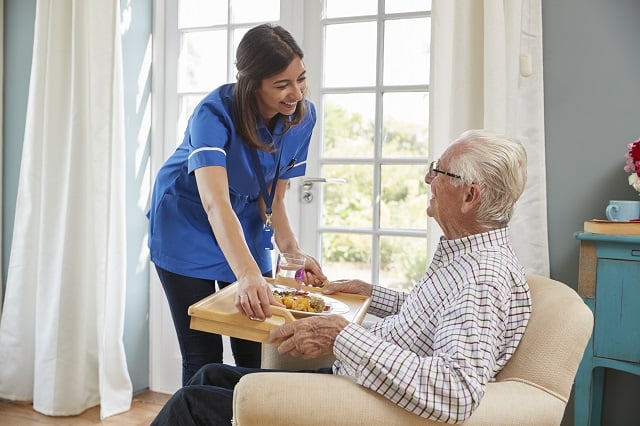
Your mother is happy where she is, and values the comfort and independence of living at home. She likes her community and neighborhood, and likes being surrounded by memories and artifacts collected over many years. But lately she has been venturing less and less into the community, and the artifacts and empty rooms in her home are beginning to gather dust. When you visit with your family on weekends, you see her struggling in the kitchen, and wonder what she eats when you are not around to help her cook.
You want your mom to be happy and comfortable, but even she will admit that life would be easier, and probably more fun, if she had some daily assistance with the tasks she can no longer manage on her own. Home health aides for the elderly can be the perfect answer, and allow her to stay in her house for many more years than she’d be able to if she had to manage alone.
More than 7.5 million Americans receive some type of in-home care, and thousands of reputable agencies across the country exist to provide it. Home health aides, and their close cousins personal aides and home care aides, offer a variety of services designed to make it easier for seniors to take care of themselves and their homes.
Home health aides help elderly clients get out of bed, bathe, dress, and groom. Aides also assist with light housekeeping and homemaking tasks like laundry, changing bed linens, shopping for food, and meal preparation. Some provide transport, and accompany clients to doctors’ appointments or on other errands.
Home health aides, personal aides and home care aides provide instruction and psychological support to the elderly. They may also advise families and patients on nutrition, cleanliness, and household tasks.
In general, home health aides for the elderly and personal and home care aides have similar job duties, but home health aides typically work for certified home health agencies that receive government funding and comply with certain regulations. This means that they must work under the direct supervision of a medical professional, usually a nurse.
Because of this, elderly home health aides are able to perform some basic health-related services that personal aides do not. They can administer medications, and check a patient’s pulse rate, temperature, and respiration. They also may help with exercises prescribed by a physical therapist. Some home health aides are trained to change simple dressings, give massages, provide skin care, or assist with braces and artificial limbs.
 Home Adaptations for Your Needs
Home Adaptations for Your Needs  Retiring in Your Own Home: How Baby Boomers Can Age In Place
Retiring in Your Own Home: How Baby Boomers Can Age In Place  Modern Design Trends & Advice for Aging in Place
Modern Design Trends & Advice for Aging in Place  Preparing Your Business for the Aging-in-Place Boom
Preparing Your Business for the Aging-in-Place Boom  Remodeling With Seniors in Mind
Remodeling With Seniors in Mind 

Are You Familiar With This Topic? Share Your Experience.